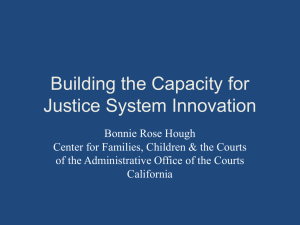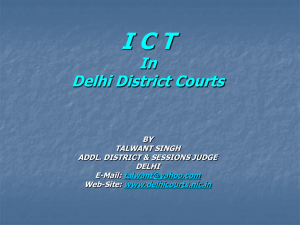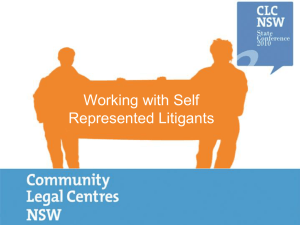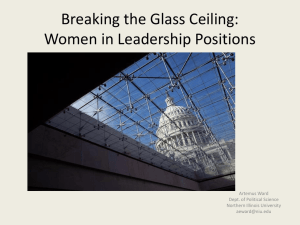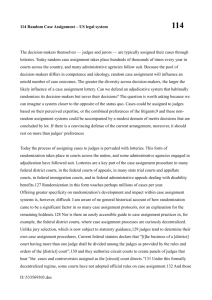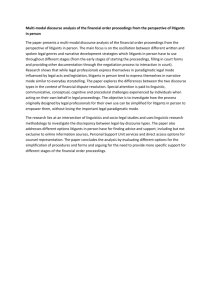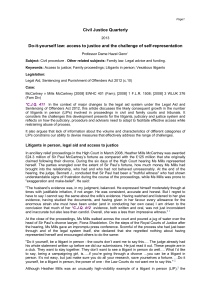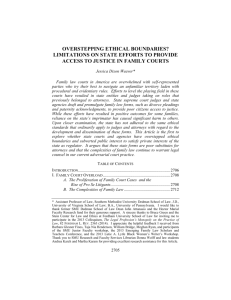DIY Litigation - Avoiding the Pitfalls
advertisement
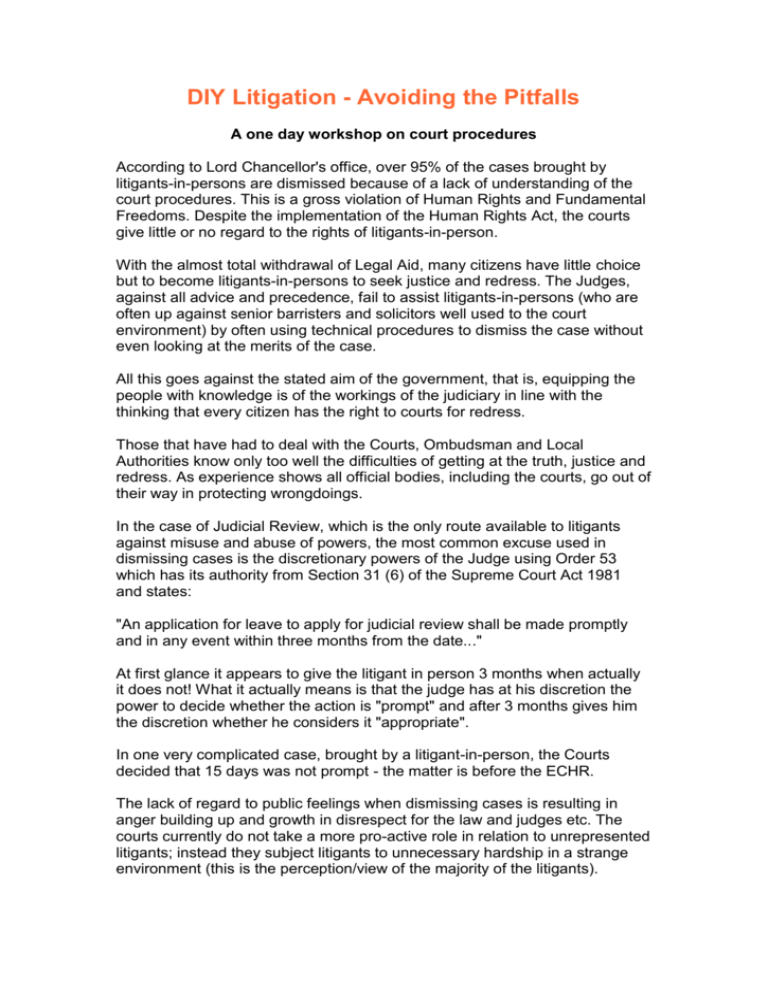
DIY Litigation - Avoiding the Pitfalls A one day workshop on court procedures According to Lord Chancellor's office, over 95% of the cases brought by litigants-in-persons are dismissed because of a lack of understanding of the court procedures. This is a gross violation of Human Rights and Fundamental Freedoms. Despite the implementation of the Human Rights Act, the courts give little or no regard to the rights of litigants-in-person. With the almost total withdrawal of Legal Aid, many citizens have little choice but to become litigants-in-persons to seek justice and redress. The Judges, against all advice and precedence, fail to assist litigants-in-persons (who are often up against senior barristers and solicitors well used to the court environment) by often using technical procedures to dismiss the case without even looking at the merits of the case. All this goes against the stated aim of the government, that is, equipping the people with knowledge is of the workings of the judiciary in line with the thinking that every citizen has the right to courts for redress. Those that have had to deal with the Courts, Ombudsman and Local Authorities know only too well the difficulties of getting at the truth, justice and redress. As experience shows all official bodies, including the courts, go out of their way in protecting wrongdoings. In the case of Judicial Review, which is the only route available to litigants against misuse and abuse of powers, the most common excuse used in dismissing cases is the discretionary powers of the Judge using Order 53 which has its authority from Section 31 (6) of the Supreme Court Act 1981 and states: "An application for leave to apply for judicial review shall be made promptly and in any event within three months from the date..." At first glance it appears to give the litigant in person 3 months when actually it does not! What it actually means is that the judge has at his discretion the power to decide whether the action is "prompt" and after 3 months gives him the discretion whether he considers it "appropriate". In one very complicated case, brought by a litigant-in-person, the Courts decided that 15 days was not prompt - the matter is before the ECHR. The lack of regard to public feelings when dismissing cases is resulting in anger building up and growth in disrespect for the law and judges etc. The courts currently do not take a more pro-active role in relation to unrepresented litigants; instead they subject litigants to unnecessary hardship in a strange environment (this is the perception/view of the majority of the litigants). Furthermore, the litigants sincerely believe that the judge who should preserve equality of arms at the hearing between represented and unrepresented litigants instead their powers against the interest of litigants. The mushrooming of anti-judicial websites is but one sad reflection of the increasing problem. By shutting down such sites does not deal with the issue it only ferments anger further; instead of educating the people about the legal system in a broader sense and judges to interpret procedural errors in a broad sense, the Lord Chancellor's officer is only "papering" over the problem. Citizens need to be informed about their rights and obligations in order to become responsible and effective members of society. They must not be let to feel disenfranchised by the very system that is there to see fair play. There is a growing public perception that decisions are already made prior to a hearing, and that a hearing is just a public relations exercise. It is left to the litigant-in-person, against all odds, to convince the judge the basis of the application. Similarly, it is evident to anyone when attending the court that often the judges have not read the bundle prior to the hearing. We feel that respect for law is essential in any country. Equally it must be realised these are ordinary people whom many till that day could not claim to have a parking ticket fine to their name are forced to undertake the cases because they cannot afford the high and often disproportionate costs of legal representation and are not eligible for legal aid, which has virtually dried up. Many have been let down by the legal profession and feel disenfranchised by the judicial system because they unable to fund further action using lawyers. It is crucial that litigants make sure that their statements of claim, particulars, and provisions of the law are correctly stated. Lack of thought at this stage often means the right to redress is diminished and allows the judicial system to dismiss the case. The lack of working knowledge of the courts leads to many more being effectively barred from access to justice as they either do not know of their rights to make or defend a claim or do not know how to do so. We get a large number of calls to this effect regularly. The fact that judges are unaccountable is not in dispute and is a separate matter to that immediately facing a litigant. It is generally accepted that there is considerable power in the hands of judges, above that of a Parliament, which is elected by the people and makes laws with their authority. It is also said that the British judges do not represent British society. They are still almost exclusively drawn from the Bar with the Lord Chancellor making senior appointments, himself an unelected politician and not accountable to the public. Once appointed, they cannot be dismissed. For those of us who have had dealing with Lord Chancellor's office will only know too well that the degree to which they are prepared to go in order to cover up wrong doings. And those that have the privilege of standing in front of judges know only too well, the often hostile, irrational and unreasonable environment one is subjected to in search of justice. Equally it must be said that there are very good judges in the UK. To believe that abuses are confined only to ethnic groups and or left-leaning organisations is certainly not true. A majority of the people subjected to such abuses and misuses of powers by officials and courts are usually middle class families (of all races, colours, sexes and ages). The fact that you belong to an ethnic group only exacerbates the degrees of such abuse. Criticising judges and or being abusive does nothing to alleviate the problem. In order to attempt to redress this we are proposing to organise in the first instance a one-day workshop to acquaint the people with basic knowledge on procedural requirement in attempting to bring an action. The workshop will be divided into four sessions: 1. Procedures in National Courts 2. ECHR 3. ECJ 4. EU Parliament Detail will be posted nearer the date. Because of high demand, there will be now workshops across the country. The proposed date of the workshops will be sometime in 2003, and will be on first come first serve basis. Only those registered will be allowed to attend. As is the practise of ELC, NGOs, litigants in persons, students, OAP are free on first come first basis; all others £25.00
